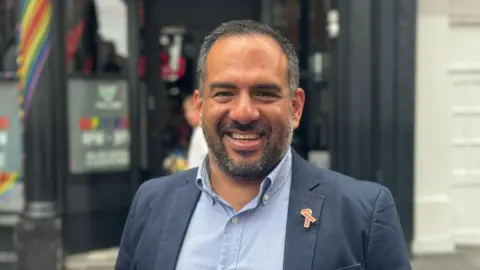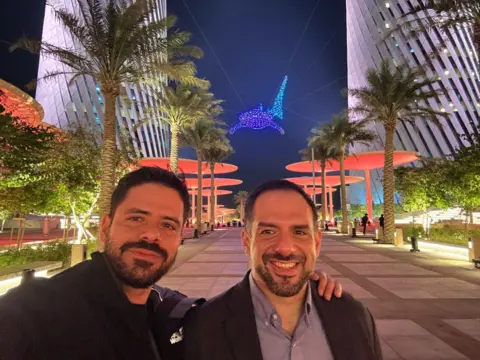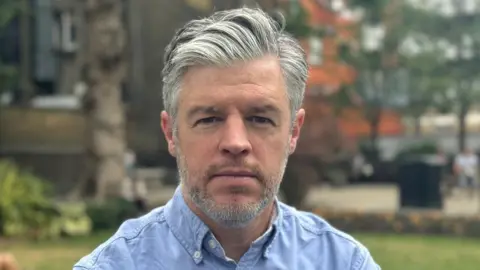I never thought I'd get home, gay man arrested in Qatar says
 Stuart Antrobus/BBC
Stuart Antrobus/BBCA British-Mexican man convicted of drug offences in Qatar after being detained there for six months has told BBC News he “never thought I’d return home".
In his first interview since leaving the country, Manuel Guerrero Aviña, who says he was targeted because he is gay, warned LGBT people to “be careful when visiting Qatar”, saying: “What happened to me could happen to anyone.”
He was arrested in February after arranging to meet a man - who he later found out was an undercover police officer - using gay dating app Grindr.
Human-rights groups have raised concerns over Manuel's detention and called his trial “grossly unfair” - but Qatari officials insist he was arrested because of drug offences.
The 45-year-old former British Airways worker now wants to focus on returning to work and spending time with his family.
Manuel made headlines around the world following his arrest and his family started a campaign for him to be freed.
At a court hearing in June, he was found guilty of possessing an illegal substance, given a six-month suspended prison sentence, fined £2,100 and was the subject of a deportation order.
After returning to the UK, he has - for the first time - given a first-hand account of his 44 days in a Qatari prison and subsequent detention in the country.
“There were so many times I was terrified,” Manuel said.
“I thought I would never be able to leave.
"I thought I might get lost in the system.
"I was really scared.
"I never thought I’d return home safely.”
Sexual partners
Manuel has always insisted police officers planted drugs in his flat and says the real reason for his arrest was his sexuality.
“I absolutely deny the drugs charges," he told BBC News.
"Throughout the entire interrogation, everything they asked me about was about my sexual partners, my sexual orientation, whether I’ve been having sex, who I have had sex with and things like that.
“If it was just a drugs case, they would have been asking me about drugs.”
'Being discreet'
Homosexuality is criminalised in Qatar and human-rights organisations have repeatedly raised concerns about the treatment of LGBT people in the country.
But Manuel said he had lived there for seven years without getting in trouble with police.
“There seemed to be an unwritten rule that whatever went on in private was OK,” he said.
“I thought I was being compliant by being discreet when [in public] and following the rules - but I was just trying to live a little bit of my life behind doors.
"I thought it was fine as long as it wasn’t in public.”
BBC News previously reported how, on 4 February, Manuel had been messaging a man on dating apps Grindr and Tinder and invited him to his flat.
After going to meet the man in the lobby of his building, Manuel says he was instead met by police officers who handcuffed him before searching his flat, eventually arresting him.
 Family Handout
Family HandoutDuring his time in prison, Manuel says, he witnessed people being whipped and was moved into cramped conditions after refusing to unlock his phone or disclose the names and phone numbers of other LGBT people living in Qatar.
“They were trying to force me to confess and unlock my phone - but I couldn’t put other people from the gay community at risk," he said.
"Why would I put someone else through that pain?”
BBC News has seen a confession, written in Arabic, which Manuel says he was forced to thumbprint without the presence of a lawyer or the aid of a translator.
We cannot independently verify all of his claims.
Many of the accusations about his treatment after his arrest relate to time spent behind closed doors with few witnesses.
But the Guerrero Aviña family has shared a detailed timeline of events - and previous reporting on the treatment of LGBT people and the behaviour of police officers in Qatar suggest others have had similar experiences.
A Qatari official told BBC News Manuel had been treated with “dignity and respect throughout his detention” and sentenced “following an investigation and trial”.
He had been arrested "for possessing an illegal substance” and "no other factors were considered when making the arrest”.
"Mr Aviña and his family have made numerous false allegations in an attempt to generate public sympathy and support for his case," the official said.
“A person's beliefs, background or orientation do not exempt them from the law, especially when facing serious charges related to drug possession.
"Qatar has stringent laws governing the possession of illegal drugs - and the authorities are continuously working to combat this issue.
“As Mr Aviña himself has acknowledged, he lived in Qatar without any issues for seven years.”
 Stuart Antrobus/BBC
Stuart Antrobus/BBCBut former British diplomat in Qatar and co-director of human-rights organisation FairSquare James Lynch said the trial had been “grossly unfair” and likened it to other cases he had dealt with.
“Manuel was clearly targeted because he was LGBT and living in Qatar and living his life,” Mr Lynch said.
“Over the last three years, we’ve dealt with several cases of people who’ve been arrested and then interrogated without a lawyer.
"The Qataris need to sort out the way justice is delivered in the country.”
'Holding hands'
Manuel, who is living with Human Immunodeficiency Virus, was also supported by HIV charities in the UK, after claims he had not been given regular access to his medication, which keeps the virus under control.
He said: “I had to beg on a daily basis to prison officers to try and get access to my medication.
"It was a really difficult time for me without access to my medication, because you’re worried about the effects on your health and it also has an impact on your mental health.”
Now back in the UK, Manuel says, he is receiving medical attention and slowly becoming more able to be his true self.
“It’s not about seeing symbols everywhere like rainbows or flags," he said.
"It’s more that it feels amazing to be able to recover some of the small things that you don’t realise you’ve lost until you have them back.
“Things like seeing people holding hands in the street, being able to be affectionate with my friends without thinking about how we’re interacting, being able to do that without it being behind closed doors.”
